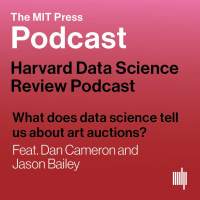Synopsis
Interviews with Economists about their New Books
Episodes
-
Simon Sharpe, "Five Times Faster: Rethinking the Science, Economics, and Diplomacy of Climate Change" (Cambridge UP, 2023)
14/06/2023 Duration: 30minWe need to act five times faster to avoid dangerous climate change. As Greenland melts, Australia burns, and greenhouse gas emissions continue to rise, we think we know who the villains are: oil companies, consumerism, weak political leaders. But what if the real blocks to progress are the ideas and institutions that are supposed to be helping us? Five Times Faster: Rethinking the Science, Economics, and Diplomacy of Climate Change (Cambridge UP, 2023) is an inside story from Simon Sharpe, who has spent ten years at the forefront of climate change policy and diplomacy. In our fight to avoid dangerous climate change, science is pulling its punches, diplomacy is picking the wrong battles, and economics has been fighting for the other side. This provocative and engaging book sets out how we should rethink our strategies and reorganise our efforts in the fields of science, economics, and diplomacy, so that we can act fast enough to stay safe. Learn more about your ad choices. Visit megaphone.fm/adchoices Support
-
Fredrik Albritton Jonsson and Carl Wennerlind, "Scarcity: A History from the Origins of Capitalism to the Climate Crisis" (Harvard UP, 2023)
12/06/2023 Duration: 01h01minScarcity: A History from the Origins of Capitalism to the Climate Crisis (Harvard UP, 2023) is a sweeping intellectual history of the concept of economic scarcity—its development across five hundred years of European thought and its decisive role in fostering the climate crisis. Modern economics presumes a particular view of scarcity, in which human beings are innately possessed of infinite desires and society must therefore facilitate endless growth and consumption irrespective of nature’s limits. Yet as Fredrik Albritton Jonsson and Carl Wennerlind show, this vision of scarcity is historically novel and was not inevitable even in the age of capitalism. Rather, it reflects the costly triumph of infinite-growth ideologies across centuries of European economic thought—at the expense of traditions that sought to live within nature’s constraints. The dominant conception of scarcity today holds that, rather than master our desires, humans must master nature to meet those desires. Albritton Jonsson and Wennerlind
-
Payal Arora et al., "Feminist Futures of Work: Reimagining Labour in the Digital Economy" (Amsterdam UP, 2023)
12/06/2023 Duration: 40minThe future of work is at the centre of debates related to the emerging digital society. Concerns range from the inclusion, equity, and dignity of those at the far end of the value chain, who participate on and off platforms, often in the shadows, invisible to policymakers, designers, and consumers. Precarity and informality characterize this largely female workforce, across sectors ranging from artisanal work to salon services to ride-hailing and construction. A feminist reimagining of the futures of work - what we term “FemWork” - is the need of the day and should manifest in multiple and various forms, placing the worker at the core and drawing on her experiences, aspirations, and realities. Payal Arora, Usha Raman, and René König's book Feminist Futures of Work: Reimagining Labour in the Digital Economy (Amsterdam UP, 2023) offers grounded insights from academic, activist, legal, development and design perspectives that can help us think through these inclusive futures and possibly create digital, social,
-
Brendan Keogh, "The Videogame Industry Does Not Exist: Why We Should Think Beyond Commercial Game Production" (MIT Press, 2023)
11/06/2023 Duration: 59minThe videogame industry, we're invariably told, is a multibillion-dollar, high-tech business conducted by large corporations in certain North American, European, and East Asian cities. But most videogames today, in fact, are made by small clusters of people working on shoestring budgets, relying on existing, freely available software platforms, and hoping, often in vain, to rise to stardom—in short, people working like artists. Aiming squarely at this disconnect between perception and reality, Brendan Keogh's book The Videogame Industry Does Not Exist: Why We Should Think Beyond Commercial Game Production (MIT Press, 2023) presents a much more accurate and nuanced picture of how the vast majority of videogame-makers work—a picture that reveals the diverse and precarious communities, identities, and approaches that make videogame production a significant cultural practice. Drawing on insights provided by over 400 game developers across Australia, North America, Europe, and Southeast Asia, Keogh develops a new
-
Amanda L. Van Lanen, "The Washington Apple: Orchards and the Development of Industrial Agriculture" (U Oklahoma Press, 2022)
09/06/2023 Duration: 48minIn the nineteenth century, most American farms had a small orchard or at least a few fruit-bearing trees. People grew their own apple trees or purchased apples grown within a few hundred miles of their homes. Nowadays, in contrast, Americans buy mass-produced fruit in supermarkets, and roughly 70 percent of apples come from Washington State. So how did Washington become the leading producer of America’s most popular fruit? In The Washington Apple: Orchards and the Development of Industrial Agriculture (The University of Oklahoma Press, 2022), Amanda L. Van Lanen offers a comprehensive response to this question by tracing the origins, evolution, and environmental consequences of the state’s apple industry. Washington’s success in producing apples was not a happy accident of nature, according to Van Lanen. Apples are not native to Washington, any more than potatoes are to Idaho or peaches to Georgia. In fact, Washington apple farmers were late to the game, lagging their eastern competitors. The author outlines
-
Anne L. Murphy, "Virtuous Bankers: A Day in the Life of the Eighteenth-Century Bank of England" (Princeton UP, 2023)
08/06/2023 Duration: 51minThe eighteenth-century Bank of England was an institution that operated for the benefit of its shareholders--and yet came to be considered, as Adam Smith described it, "a great engine of state." In Virtuous Bankers: A Day in the Life of the Eighteenth-Century Bank of England (Princeton UP, 2023), Anne Murphy explores how this private organization became the guardian of the public credit upon which Britain's economic and geopolitical power was based. Drawing on the voluminous and detailed minute books of a Committee of Inspection that examined the Bank's workings in 1783-84, Murphy frames her account as "a day in the life" of the Bank of England, looking at a day's worth of banking activities that ranged from the issuing of bank notes to the management of public funds. Murphy discusses the bank as a domestic environment, a working environment, and a space to be protected against theft, fire, and revolt. She offers new insights into the skills of the Bank's clerks and the ways in which their work was organized,
-
Art Auctions and Data Science
04/06/2023 Duration: 38minWhat does data science tell us about art auctions? This episode is syndicated from the new Harvard Data Science Review Podcast. Published by the MIT Press, Harvard Data Science Review is an open access multidisciplinary journal that defines and shapes data science as a scientifically rigorous field based on the principled and purposed production, processing, parsing and analysis of data. In this episode, the journal’s Features Editor Liberty Vittert and Editor in Chief Xiao-Li Meng discuss art auctions with art curator Dan Cameron and Artnome’s Jason Bailey. If you enjoy this preview of the Harvard Data Science Review podcast, find the journal on twitter at @TheHDSR and remember to subscribe to their podcast on your favorite platform. Learn more about your ad choices. Visit megaphone.fm/adchoices Support our show by becoming a premium member! https://newbooksnetwork.supportingcast.fm/economics
-
The Future of Big Finance: A Discussion with Anastasia Nesvetailova
03/06/2023 Duration: 46minHow common is financial malpractice in big, well known financial companies? Is it so common that it should really be seen as a business model more than an occasional aberration by rogue traders? These are questions posed by Ronen Palan and Anastasia Nesvetailova in their book Sabotage: The Business of Finance (PublicAffairs, 2020). Listen to Owen Bennett-Jones discuss the future of big finance with Anastasia Nesvetailova. Owen Bennett-Jones is a freelance journalist and writer. A former BBC correspondent and presenter he has been a resident foreign correspondent in Bucharest, Geneva, Islamabad, Hanoi and Beirut. He is recently wrote a history of the Bhutto dynasty which was published by Yale University Press. Learn more about your ad choices. Visit megaphone.fm/adchoices Support our show by becoming a premium member! https://newbooksnetwork.supportingcast.fm/economics
-
Daron Acemoglu and James A. Robinson, "The Narrow Corridor: States, Societies, and the Fate of Liberty" (Penguin, 2020)
02/06/2023 Duration: 51minDoes a strong state mean a weak market? This is a common misconception amongst economists. Many view the state as either taxing and regulating the market too much or too little. However, the truth is that state capacity is just not well conceptualized in economic theory. James A. Robinson is a political scientist, economist, and professor at the University of Chicago. His recent book, co-authored with Daron Acemoglu, The Narrow Corridor: States, Societies, and the Fate of Liberty, explores the critical balance needed between state and society and how liberty can continue to thrive despite threats from both sides. James and Greg explore the correlation between inclusive political institutions and economic growth and prosperity and why the absence of state capacity in developing nations is a major contributing factor to their economic struggles. This highlights the necessity for a genuine debate on whether strong governments and effective state institutions facilitate or stifle independence and innovation. Greg
-
Perry Mehrling, "Money and Empire: Charles P. Kindleberger and the Dollar System" (Cambridge UP, 2022)
02/06/2023 Duration: 58minCharles Kindleberger ranks as one of the twentieth century's best known and most influential international economists. This book traces the evolution of his thinking in the context of a 'key-currency' approach to the rise of the dollar system, here revealed as the indispensable framework for global economic development since World War II. Unlike most of his colleagues, Kindleberger was deeply interested in history, and his economics brimmed with real people and institutional details. His research at the New York Fed and BIS during the Great Depression, his wartime intelligence work, and his role in administering the Marshall Plan gave him deep insight into how the international financial system really operated. A biography of both the dollar and a man, Money and Empire (Cambridge University Press, 2022) also the story of the development of ideas about how money works. It throws revealing light on the underlying economic forces and political obstacles shaping our globalized world. Perry Mehrling is Professor
-
William J. Bernstein, "The Delusions of Crowds: Why People Go Mad in Groups" (Grove Press, 2021)
29/05/2023 Duration: 54minWhat do financial bubbles and religious millenarianism have in common? They both involve collective delusion. When Charles Mackey wrote a book on the Madness of Crowds in the 19th century, he could not have imagined that religious and financial bubbles will continue to reappear, but as Willam Bernstein points out, the world has not gotten any saner. William Bernstein is an investment manager and the author of a number of books including, The Delusions Of Crowds: Why People Go Mad in Groups and The Birth of Plenty: How the Prosperity of the Modern World was Created. And before his work in finance, he spent more than 30 years practicing medicine. William and Greg discuss the difference between intelligence and rationality, how human nature is rooted in imitation and mimicry, and the end of the world. Gregory LaBlanc is a lifelong educator with degrees in History, PPE, Business, and Law, Greg currently teaches at Berkeley, Stanford, and HEC Paris. He has taught in multiple disciplines, from Engineering to Econom
-
Lawrence H. White, "Better Money: Gold, Fiat, or Bitcoin?" (Cambridge UP, 2023)
28/05/2023 Duration: 43minThe recent rise of dollar, pound, and euro inflation rates has rekindled the debate over potential alternative monies, particularly gold and Bitcoin. Though Bitcoin has been much discussed in recent years, a basic understanding of how it and gold would work as monetary standards is rare. Accessibly written by a pioneering economist, Better Money explains and evaluates gold, fiat, and Bitcoin standards without hype. White uses simple supply-and-demand analysis to explain how these standards work, evaluating their relative merits and explaining their response to shocks, allowing for informed comparisons between them. This book addresses common misunderstandings of the gold standard and Bitcoin, using historical evidence to review the history of money with emphasis on the contest between market and government provision. Known for his work on alternative monetary institutions, White offers a reasoned discussion of which standard is most likely to provide a better money. In Better Money: Gold, Fiat, or Bitcoin? (C
-
Missing: Men at Work — A Conversation with Nick Eberstadt
26/05/2023 Duration: 50minOver six million prime-age men are neither working nor looking for work; America's low unemployment rate hides the fact that many men have dropped out of the workforce altogether. Our workforce participation rate is on par with that seen during the Great Depression. Why does this problem affect men so acutely? Why is it so specific to America? What are these missing men doing with their time? How do we differentiate between leisure and idleness? Demographer and economist Nicholas Eberstadt of the American Enterprise Institute discusses these trends and what they mean for America's future. Eberstadt is the author of Men Without Work. Learn more about your ad choices. Visit megaphone.fm/adchoices Support our show by becoming a premium member! https://newbooksnetwork.supportingcast.fm/economics
-
Scott Timcke, "The Political Economy of Fortune and Misfortune: Prospects for Prosperity in Our Times" (Bristol UP, 2023)
25/05/2023 Duration: 36minLuck greatly influences a person's quality of life. Yet little of our politics looks at how institutions can amplify good or bad luck that widens social inequality. But societies can change their fortune. Too often debates about inequality focus on the accuracy of data or modelling while missing the greater point about ethics and exploitation. In the wake of growing disparity between the 1% and other classes, The Political Economy of Fortune and Misfortune: Prospects for Prosperity in Our Times (Bristol University Press, 2023) combines philosophical insights with social theory to offer a much-needed political economy of life chances. Scott Timcke advances new thought on the role luck plays in redistributive justice in 21st century capitalism. Michael O. Johnston, Ph.D. is an Assistant Professor of Sociology at William Penn University. He is the author of Community Media Representations of Place and Identity at Tug Fest: Reconstructing the Mississippi River (Lexington, 2022). His general area of study is on me
-
Adrian R. Bazbauers and Susan Engel, "The Global Architecture of Multilateral Development Banks: A System of Debt or Development?" (Routledge, 2023)
24/05/2023 Duration: 01h16minAdrian Bazbauers and Susan Engel’s 2021 book The Global Architecture of Multilateral Development Banks: A System of Debt or Development? (Routledge, 2023) explores the evolution of the 30 functioning multilateral development banks (MDBs). MDBs have their roots in the growing system of international finance and multilateral cooperation, with the first recognizable MDB being proposed by Latin America in financial cooperation with the US in the late 1930s. That Inter-American Bank did not eventuate but was a precursor to the World Bank being negotiated at Bretton Woods in 1944. Since then, a complex network of regional, sub-regional, and specialized development banks has progressively emerged across the globe, including two significant recent entrants established by China and the BRICS. MDBs arrange loans, credits, and guarantees for investment in member states, generally with the stated aim of fostering economic growth. They operate in both the Global North and South, though there are more MDBs focusing on emer
-
Truth, Fiction, and Student Loan Forgiveness: A Conversation with Beth Akers
22/05/2023 Duration: 40minWith the Biden Administration's student loan relief coming down the pike, Annika sits down with Dr. Beth Akers, a Senior Fellow at the American Enterprise Institute who specializes in higher education finance. Beth discusses the issue of student debt, and what the Biden relief plan will and will not achieve. You can find more information about Dr. Akers and her recent writing and appearances here. Learn more about your ad choices. Visit megaphone.fm/adchoices Support our show by becoming a premium member! https://newbooksnetwork.supportingcast.fm/economics
-
Jonathan Adeyemi, "Contemporary Art from Nigeria in the Global Markets: Trending in the Margins" (Palgrave MacMillan, 2022)
21/05/2023 Duration: 35minHow does the art market work? In Contemporary Art from Nigeria in the Global Markets: Trending in the Margins (Palgrave Macmillan, 2022), Jonathan Adeyemi, who holds a PhD from, and was formerly Associate Lecturer in Arts Management and Cultural Policy at, Queen’s University Belfast, explores the unequal power dynamics of contemporary at by focusing on the case study of Nigeria. The book draws on a wealth of historical and theoretical knowledge, alongside detailed engagements with art history, sociology, and cultural policy themes, to show how and why contemporary artists from Nigeria are not afforded the same status as their western counterparts. An important addition across a range of academic fields, the book is essential reading across the arts, humanities and social sciences, as well as for anyone interested in art today. Dave O'Brien is Professor of Cultural and Creative Industries, at the University of Sheffield. Learn more about your ad choices. Visit megaphone.fm/adchoices Support our show by becomin
-
Inflation, Past and Present: A Conversation with Tyler Goodspeed
19/05/2023 Duration: 43minWe all know that things are a little more expensive when we head to the grocery store. But what does inflation actually mean? How did we get to where we are, and what happens next? What does history have to say about our current economic situation? Annika sits down with Tyler Goodspeed of the Hoover Institution. Dr. Goodspeed served in the White House as Acting Chairman of the Council of Economic Advisers from 2020-2021, and was formerly on the Faculty of Economics at the University of Oxford, where he specialized in financial history. Learn more about your ad choices. Visit megaphone.fm/adchoices Support our show by becoming a premium member! https://newbooksnetwork.supportingcast.fm/economics
-
Mark Paul, "The Ends of Freedom: Reclaiming America's Lost Promise of Economic Rights" (U Chicago Press, 2023)
18/05/2023 Duration: 53minSince the Founding, Americans have debated the true meaning of freedom. For some, freedom meant the provision of life's necessities, those basic conditions for the "pursuit of happiness." For others, freedom meant the civil and political rights enumerated in the Bill of Rights and unfettered access to the marketplace--nothing more. As Mark Paul explains, the latter interpretation--thanks in large part to a particularly influential cadre of economists--has all but won out among policymakers, with dire repercussions for American society: rampant inequality, endemic poverty, and an economy built to benefit the few at the expense of the many. In The Ends of Freedom: Reclaiming America's Lost Promise of Economic Rights (University of Chicago Press, 2023), Paul shows how economic rights--rights to necessities like housing, employment, and health care--have been a part of the American conversation since the Revolutionary War and were a cornerstone of both the New Deal and the Civil Rights Movement. Their recuperatio
-
Claire Provost and Matt Kennard, "Silent Coup: How Corporations Overthrew Democracy" (Bloomsbury, 2023)
17/05/2023 Duration: 44minAs European empires crumbled in the 20th century, the power structures that had dominated the world for centuries were up for renegotiation. Yet instead of a rebirth for democracy, what emerged was a silent coup – namely, the unstoppable rise of global corporate power. Exposing the origins of this epic power grab as well as its present-day consequences, Silent Coup: How Corporations Overthrew Democracy (Bloomsbury, 2023) by Claire Provost & Matt Kennard is the result of two investigative journalist's reports from 30 countries around the world. It provides an explosive guide to the rise of a corporate empire that now dictates how resources are allocated, how territories are governed, and how justice is defined. This interview was conducted by Dr. Miranda Melcher whose doctoral work focused on post-conflict military integration, understanding treaty negotiation and implementation in civil war contexts, with qualitative analysis of the Angolan and Mozambican civil wars. Learn more about your ad choices. Visit me

















